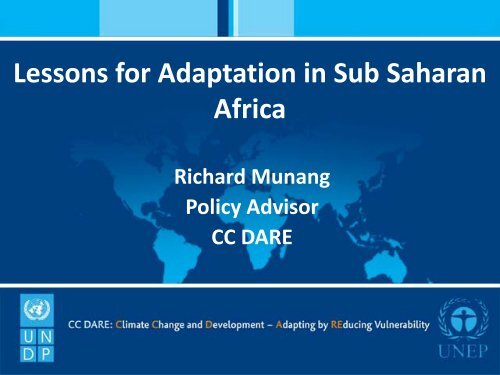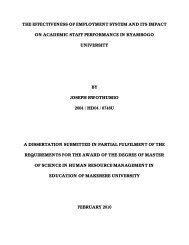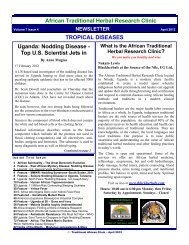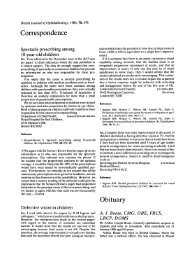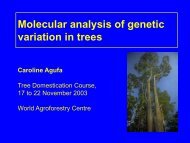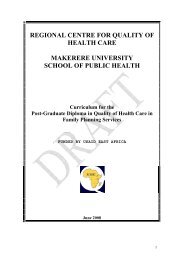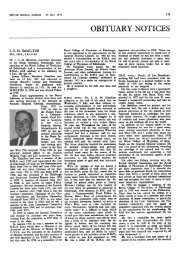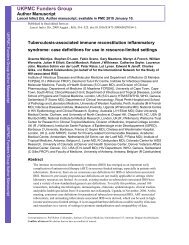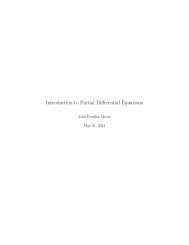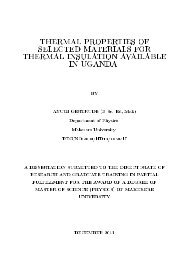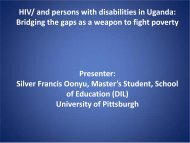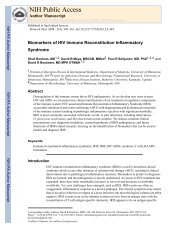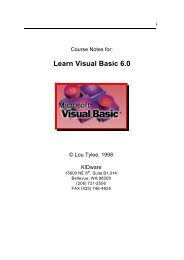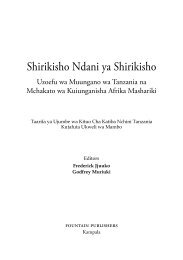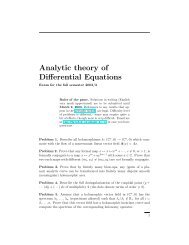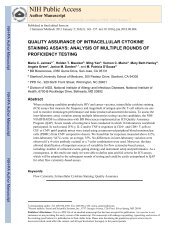CC DARE Programme
CC DARE Programme
CC DARE Programme
You also want an ePaper? Increase the reach of your titles
YUMPU automatically turns print PDFs into web optimized ePapers that Google loves.
Lessons for Adaptation in Sub Saharan<br />
Africa<br />
Richard Munang<br />
Policy Advisor<br />
<strong>CC</strong> <strong>DARE</strong>
<strong>CC</strong> <strong>DARE</strong> <strong>Programme</strong><br />
Mozambique<br />
Mozambique put forward the unavailability of long-term climate data in the most<br />
appropriate and easily usable format and the lack of climate change integrated curriculum<br />
especially at the University level as barriers to mainstreaming climate change adaptation<br />
into development frameworks.<br />
Inventorization, Digitization, Processing and Quality Control were tedious but<br />
rewarding to INAM and Mozambique
<strong>CC</strong> <strong>DARE</strong> <strong>Programme</strong><br />
Mozambique<br />
Mozambique put forward the inadequate capacity and tools to address the serious loss of<br />
soil and property in coastal cities such as Xai Xai, the lack of community based coastal zone<br />
management plan,<br />
The Municipal Council and citizenry of Xai Xai have the tool and capacity to<br />
address soil erosion and its consequential damage to infrastructure and personal<br />
property as a climate change adaptation measure
<strong>CC</strong> <strong>DARE</strong> <strong>Programme</strong><br />
Rwanda<br />
Barriers to integrating climate change adaptation into the national development frameworks<br />
of Rwanda include (a) low awareness and lack of media materials and guidelines on<br />
developing and reporting climate change information, and (b) old and obsolete Area and<br />
District level Land Suitability Maps and Plans, especially for the Gishwati Area of the<br />
Nyabihu District<br />
Water Shortage<br />
Demonstration of Landscaping
<strong>CC</strong> <strong>DARE</strong> <strong>Programme</strong><br />
Senegal<br />
Senegal’s identified barriers to mainstreaming climate change adaptation into her national<br />
development frameworks included (a) inadequate knowledge and capacities on agricultural<br />
practices that serve as adaption measures to the changing climate at the local level, (b) the<br />
lack of effective tools to inform the Local Governments and communities of coastal cities (c)<br />
the non-consideration of climate change risks into the planning and budgeting systems at<br />
the central government, local government and community levels.<br />
Training of Technicians<br />
from various Sectors in the<br />
Senegal River Delta on<br />
climate change adaptation<br />
measures and technologies<br />
Shoreline Erosion<br />
Simulated Shoreline<br />
movement
<strong>CC</strong> <strong>DARE</strong> <strong>Programme</strong><br />
Seychelles<br />
Seychelles is faced with the barriers of the unavailability of representative climate data due<br />
to large distances between meteorological stations on the islands, inadequate<br />
knowledge, awareness and capacity on the adoption of rainwater harvesting as an<br />
adaptation measure to climate change induced water stress, and inadequate knowledge and<br />
capacity of the institutions and individuals responsible for management of coastal zone in<br />
Seychelles.
<strong>CC</strong> <strong>DARE</strong> <strong>Programme</strong><br />
Togo<br />
The Republic of Togo identified (a) inadequate knowledge and awareness of the general<br />
public on climate change, weak partnership between Central Government, Local<br />
Government, Private Sector, Civil Society Organizations and Local Communities and (b) acute<br />
water stress especially in the northern districts of the country as barriers to mainstreaming<br />
climate change into national development frameworks.
<strong>CC</strong> <strong>DARE</strong> <strong>Programme</strong><br />
Uganda<br />
Barriers on mainstreaming adaptation identified in Uganda include<br />
(a) inadequate awareness at all levels of the Ugandan population but particularly at the<br />
grassroots level; (b) inadequate partnership with and networking amongst stakeholders that<br />
matter in the climate change arena; (c) vague and non-conclusive studies on the impacts of<br />
climate change and variability with respect to agriculture practices, including indigenous<br />
coping practices by farmers; and (d) national and sectoral policies,
Key Findings – So far<br />
• Concrete actions provide evidencebased<br />
information for institutional and<br />
regional policy processes in supporting<br />
countries<br />
• It facilitates experience sharing among<br />
practitioners<br />
• It provides incentives for action &<br />
builds confidence through Learning-bydoing<br />
approach
Way Forward !<br />
A. Addressing emerging needs for adaptation<br />
• Consolidation of current adaptation actions in countries<br />
• Addressing new demands from countries<br />
B. Building a Lesson Process<br />
• Learning-by-doing<br />
• Actionable learning platform & Experience Sharing<br />
• Developing common solutions to common climate risks<br />
C. Promoting Regional approaches & platforms<br />
• Operationalizing regional climate strategies e.g. AMCEN<br />
• Providing evidence-based information for institutional<br />
and regional policy processes in supporting countries
MESSAGE OF APPRECIATION<br />
“This UNEP/UNDP <strong>CC</strong> <strong>DARE</strong> is<br />
a worthwhile project which I<br />
fully endorsed. It is the way<br />
forward. If we all do our part<br />
in harvesting rainwater and<br />
are serious about it, we could<br />
all contribute to alleviating<br />
the serious shortages we face<br />
in the dry season”<br />
President James Alix Michel<br />
President of the Republic of<br />
Seychelles
Thank you<br />
www. ccdare.org


